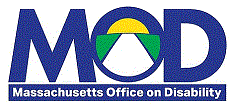- Massachusetts Office on Disability
From denial to pride: Mary Mahon McCauley’s journey with disability and identity
By Mary Mahon McCauley, Executive Director
As a child in the mid-1960s, staff in my school realized that I had difficulty seeing. This realization was the result of an in-school vision exam that led to eight years of medical and paramedical professionals trying to determine my diagnosis and, in turn, any prognosis. I felt confused and wasn’t sure what to expect. These years were full of frustration and anger and the feeling that no one believed in me. I spent hours sitting in waiting rooms with my mother only to hear these adult specialists use words like “peripheral”, “rods”, “cones”, and “visual acuity”.
I wish I could say that there were also conversations about ways that I could more effectively function in my world as a child with a serious visual impairment, but I never saw any of that.
In response, I stubbornly remained in the world of denial and acted as though I did not have a visual impairment. During oral reading exercises in school, I would reread my paragraph multiple times in my head to have it almost memorized when it came to my turn to read aloud, to mask the fact that I had difficulty seeing. If test questions were written on the blackboard where I couldn’t see them, I’d hand in a blank test out of embarrassment rather than admit that I could not see the questions. I had been an A student in first and second grade, but by the fifth grade my grades had started to decline.
As my grades declined, I felt ashamed and embarrassed. Navigating junior high school, I felt the social stigma of being “broken.” I spent days between fourth and eleventh grade attending appointments with optometrists, ophthalmologists, neurologists, psychiatrists, neuropsychologists, and many other types of medical professionals and technicians. Finally, at age seventeen, I was diagnosed correctly with a specific progressive eye disease and registered with the Massachusetts Commission for the Blind (MCB) as Legally Blind. By that time, some of my teachers had realized that I had a visual impairment. One of my high school teachers read some tests aloud for me to accommodate my visual impairment so I could succeed. I am grateful to that teacher to this day.
In my senior year of high school, I was referred to a low vision specialist and began using low vision aides. It was amazing. I remember leaving that appointment on the Orange Line in Boston and rushing straight to the retail store in Dorchester where my boyfriend was working. I read a full paragraph of text for a magazine with my 8x magnifier glasses. The right eye had the magnification, and the left lens was nonprescription. I almost had my nose on the page, but I was happy and proud. A new world had opened for me.
After high school, I attended UMass Boston and received support from MCB to assist with financial resources as well as low vision aides. I was also introduced to the Disability Student Center and began to meet many people with all types of disabilities. I had found my community – it was a watershed moment. But at the same time, the effects of alcohol and drugs became more and more apparent in my life. The drinking and drug use I had started as a teen escalated to what is now referred to as a Substance Use Disorder or Alcoholism. With the realization that my life was remaining stagnant, I quit drinking at the age of 23. That was one of the most difficult things I’ve done in my lifetime.
My personal journey of recovery, acceptance, and adjustment would not have been possible without the support, guidance, and direction from many professionals and especially from others who also live every day with a disability. I am an enthusiastic proponent of support groups, both run by professionals and those that are facilitated by peers. I especially believe that during life challenges, from the death of a loved one to adjusting to life with a disability, peer support is valuable beyond words.
After graduate school, I knew that I wanted a career that would allow me to give back to the community that had given me so much. I was employed for 30 years with the Massachusetts Rehabilitation Commission in a variety of roles, beginning as a Vocational Rehabilitation Counselor. I also worked as a Low Vision Group Coordinator for the Massachusetts Association for the Blind and Visually Impaired for 16 years. As the group coordinator, I would facilitate various discussions regarding our shared experience with vision loss. We would share resources, strategies, and comical stories to support and assist each other. In 2019, I was honored to be appointed by Governor Baker as the Executive Director of the Massachusetts Office on Disability.
I can now say that I am a woman who is proud to be an individual with a disability. I owe this major life transformation to so many, including my mother and family, professionals, and the thousands of individuals with a variety of disabilities that I have known, with whom I’ve learned, advocated, worked, and lived. I truly respect and appreciate the disability community and thank you for helping me in so many ways.
